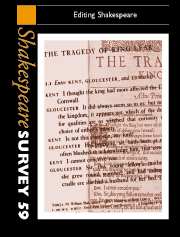Book contents
- Frontmatter
- Editing Shakespeare’s Plays in the Twentieth Century
- Crisis in Editing?
- On Being a General Editor
- Altering the Letter of Twelfth Night: ‘Some are born great’ and the Missing Signature
- ‘A Thousand Shylocks’: Orson Welles and The Merchant of Venice
- The Date and Authorship of Hand D’s Contribution to Sir Thomas More: Evidence from ‘Literature Online’
- Ferdinand’s Wife and Prospero’s Wise
- Editing Stefano’s Book
- Manuscript, Print and the Authentic Shakespeare: The Ireland Forgeries Again
- The Author, the Editor and the Translator: William Shakespeare, Alexander Chalmers and Sándor Petofi or the Nature of a Romantic Edition
- Women Edit Shakespeare
- The Shakespeare Edition in Industrial Capitalism
- Print and Electronic Editions Inspired by the New Variorum Hamlet Project
- The Evolution of Online Editing: Where Will it End?
- The Director as Shakespeare Editor
- The Editor as Translator
- Performance Editions, Editing and Editors
- Editing Collaborative Drama
- Will in the Universe: Shakespeare’s Sonnets, Plato’s Symposium, Alchemy and Renaissance Neoplatonism
- Giants and Enemies of God: The Relationship between Caliban and Prospero from the Perspective of Insular Literary Tradition
- Shakespeare’s Ages
- Who Wrote William Basse’s ‘Elegy on Shakespeare’?: Rediscovering a Poem Lost from the Donne Canon
- ‘Sometime a Paradox’: Shakespeare, Diderot and the Problem of Character
- Shakespeare Performances in England, 2005
- Professional Shakespeare Productions in the British Isles, January–December 2004
- The Year's Contributions to Shakespearian Study 1 Critical Studies
- 2 Shakespeare in Performance
- 3 Editions and Textual Studies
- Index
Who Wrote William Basse’s ‘Elegy on Shakespeare’?: Rediscovering a Poem Lost from the Donne Canon
Published online by Cambridge University Press: 28 March 2007
- Frontmatter
- Editing Shakespeare’s Plays in the Twentieth Century
- Crisis in Editing?
- On Being a General Editor
- Altering the Letter of Twelfth Night: ‘Some are born great’ and the Missing Signature
- ‘A Thousand Shylocks’: Orson Welles and The Merchant of Venice
- The Date and Authorship of Hand D’s Contribution to Sir Thomas More: Evidence from ‘Literature Online’
- Ferdinand’s Wife and Prospero’s Wise
- Editing Stefano’s Book
- Manuscript, Print and the Authentic Shakespeare: The Ireland Forgeries Again
- The Author, the Editor and the Translator: William Shakespeare, Alexander Chalmers and Sándor Petofi or the Nature of a Romantic Edition
- Women Edit Shakespeare
- The Shakespeare Edition in Industrial Capitalism
- Print and Electronic Editions Inspired by the New Variorum Hamlet Project
- The Evolution of Online Editing: Where Will it End?
- The Director as Shakespeare Editor
- The Editor as Translator
- Performance Editions, Editing and Editors
- Editing Collaborative Drama
- Will in the Universe: Shakespeare’s Sonnets, Plato’s Symposium, Alchemy and Renaissance Neoplatonism
- Giants and Enemies of God: The Relationship between Caliban and Prospero from the Perspective of Insular Literary Tradition
- Shakespeare’s Ages
- Who Wrote William Basse’s ‘Elegy on Shakespeare’?: Rediscovering a Poem Lost from the Donne Canon
- ‘Sometime a Paradox’: Shakespeare, Diderot and the Problem of Character
- Shakespeare Performances in England, 2005
- Professional Shakespeare Productions in the British Isles, January–December 2004
- The Year's Contributions to Shakespearian Study 1 Critical Studies
- 2 Shakespeare in Performance
- 3 Editions and Textual Studies
- Index
Summary
The first known poem to be composed in response to Shakespeare’s death is an elegy attributed to William Basse (1583?–1653?) that was widely copied into commonplace books of the era under various titles and printed in several seventeenth-century editions. (See Appendix for a list of sigla for the textual witnesses.) The elegy reads as follows in a single-sheet manuscript broadside (siglum c) written and signed by Basse himself (illustration 10):
On Mr William Shakespeare who dyed in Aprill 1616. Renowned Spenser, lye a thought more nye To learned Chaucer, and rare Beaumont lye A little neerer Spencer, to make roome For Shakespeare in your threefold fowerfold tombe. To lodge all fower in one bedd make a shift 5
Untill Doomesday; for hardly will a fift Betwixt this day and that, by fate be slaine For whome your Curtaines may be drawne againe. If your precedency in Death doth barr A fourth place in your sacred Sepulchre 10
Under this carved marble of thyne owne Sleep rare Tragædian, Shakespeare sleep alone Thy unmolested Peace, unshared Cave Possesse as Lord, not Tennant of thy grave. That unto us and others it may bee 15
Honor heereafter to be laid by Thee.
Mr Willm Basse.The poem has a specific agenda. After Spenser was buried next to Chaucer in Westminster Abbey in 1599, it became the practice to honour England’s most celebrated poets with burial in what is now called Poets’ Corner in Westminster Abbey, W. H. Auden being a recent case in point. The playwright Francis Beaumont was interred there in 1616 and it is the poem’s proposal that Shakespeare should be as well (lines 1–8). However, this would entail disinterring Shakespeare’s remains from his grave in Stratford and transferring them to Westminster for reburial, an audacious proposition that would require the consent of all concerned. In lines 9–16 of the elegy, the poet concedes that Shakespeare may remain buried in Stratford after all – and he diplomatically gives his assent in advance should that prove to be the case (although it is clearly his second choice).
- Type
- Chapter
- Information
- Shakespeare Survey , pp. 267 - 284Publisher: Cambridge University PressPrint publication year: 2006
- 1
- Cited by

